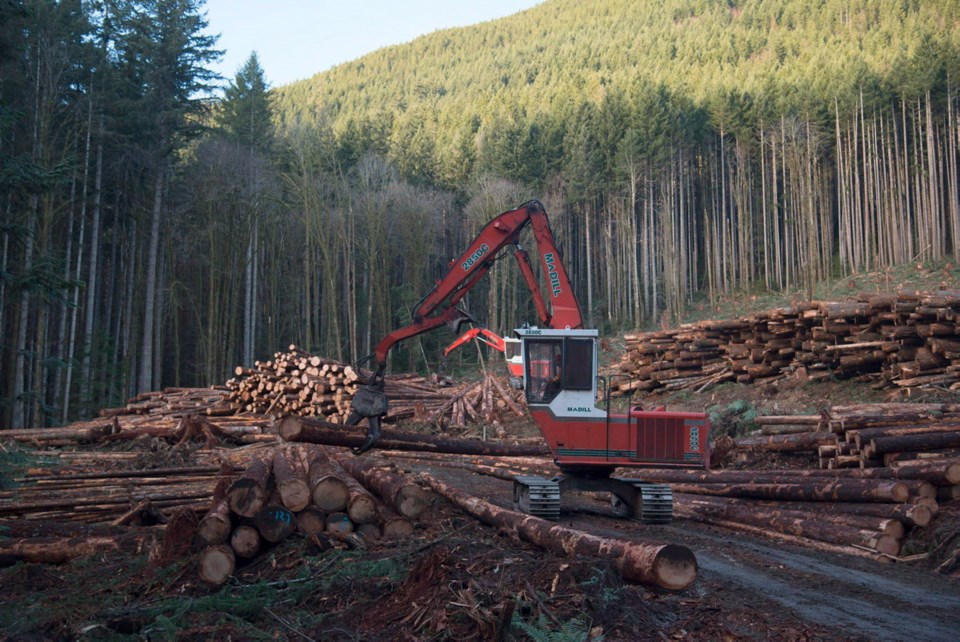B.C. is bracing for pain as the U.S. lumber industry stands poised to launch a punitive softwood lumber trade battle as early as today.
That’s when a one-year “standstill” agreement tacked onto the 2006 Canada-U.S. Softwood Lumber Agreement expires, opening the door to years of costly litigation and likely mill closures and job losses.
“With the expiration of the standstill and no agreement attained, the coalition has no choice but to move to initiate trade cases against unfairly traded imports from Canada at the most effective time,” the U.S. Lumber Coalition told Inside U.S. Trade in a statement Wednesday.
That news will be harsh, if not devastating, to Interior communities like Quesnel, the town of just over 10,000 people (2011 census) that faces the possible shutdown of two mills and a loss of 400 jobs if Ottawa can’t find a solution, said Conservative MP Todd Doherty.
“There’s a lot of concern. There are going to be mill closures for sure,” said the MP for Cariboo-Prince George, a region where the forest products industry has already been badly damaged by the mountain pine beetle infestation.
Forestry-dependent Vancouver Island communities are also likely to share the pain.
“This means small mom-and-pop operations not just in my riding, but across Canada, will face a lot of uncertainty,” Doherty said.
B.C. Forests Minister Steve Thomson said any fight will be “very expensive” and complex, but the provincial government has yet to estimate what it could cost taxpayers.
“We know it’s challenging, and while our preference remains free trade, a managed trade agreement is preferable to litigation,” Thomson said in an interview. “It’s costly for producers, costly for government and also harms U.S. consumers. We’re hopeful the continued negotiations will bear some fruit, but we’re also prepared to fight any trade litigation that might be launched and defend both B.C. and Canada.”
B.C. admits the dispute, possible duty applications, and fibre-supply challenges will put “tremendous financial stress on the industry.” Thomson wouldn’t say what government could do to help mills that might close and workers who could lose their jobs, only that the province will work with the industry once the impact of the dispute becomes clearer.
Economists say Metro Vancouver is largely insulated from the economic impact, thanks to growth in sectors like housing construction and high tech.
Canadian lumber exporters had their access to the U.S. market limited by a combination of export taxes and quotas as a result of the 2006 accord, which expired last October. The one-year standstill agreement prevented U.S. companies from launching a new action while both governments tried to find a new settlement.
The 2006 accord, while far from perfect for an industry that prefers free trade, at least provided stability for an industry that says it supports145,000 jobs in B.C.
If a legal action is started, Canadian exporters can expect to start paying preliminary countervailing duties starting near the end of March 2017. A final U.S. government determination on the level of countervailing and anti-dumping duties would be set at the end of 2017.
Canadian and U.S. negotiators held the latest in a long string of meetings in Washington, D.C., Wednesday, though analysts have long assumed there will be no breakthrough despite hopeful words expressed in June by Prime Minister Justin Trudeau and U.S. President Barack Obama.
“No one is holding their breath for a new deal any time soon,” Naomi Christensen, a lumber policy analyst with the Canada West Foundation, said Wednesday.
“Now it’s all about preparing for trade action from the U.S., as well as searching out opportunities in other markets beyond the U.S.”
B.C.’s three largest publicly owned companies — Canfor, Interfor and West Fraser Timber — have hedged their bets since the 2006 agreement by making significant investments in the U.S.
“Any duties imposed by the U.S. are going to have the biggest impact on the smaller companies who are not able to integrate into the U.S. market,” Christensen said.
There has also been a B.C.-led push over the past decade to export more wood products to Asian markets. Roughly 15 per cent of Canada’s exports go to buyers in China.



